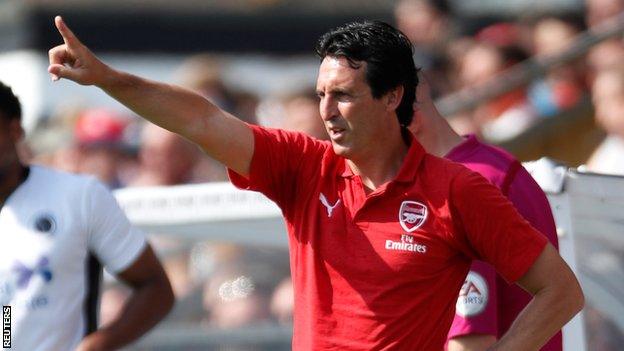Premier League: Are 'traditional' managers making way for head coaches?
- Published

Unai Emery became head coach of Arsenal in May
Is the Premier League manager as we know it becoming a thing of the past?
When Unai Emery was appointed as Arsenal boss in May, he was given the title of head coach.
For the previous 22 years, Arsene Wenger had very much been known as manager at the north London side.
And when Maurizio Sarri replaced Antonio Conte at Chelsea earlier this month, he retained his fellow Italian's title of head coach.
Sarri and Emery will be two of six head coaches in charge of English top flight clubs this season, with 14 led by managers.
But while the names of the roles might be different, there is a perception that all bosses - whether a manager or head coach - are moving away from the omnipotent gaffer who oversees every facet of a club.
Premier League - manager or head coach? | |||
|---|---|---|---|
Arsenal - Unai Emery (head coach) | Bournemouth - Eddie Howe (manager) | Brighton - Chris Hughton (manager) | Burnley - Sean Dyche (manager) |
Cardiff - Neil Warnock (manager) | Chelsea - Maurizio Sarri (head coach) | Crystal Palace - Roy Hodgson (manager) | Everton - Marco Silva (manager) |
Fulham - Slavisa Jokanovic (head coach) | Huddersfield - David Wagner (head coach) | Leicester - Claude Puel (manager) | Liverpool - Jurgen Klopp (manager) |
Man City - Pep Guardiola (manager) | Man Utd - Jose Mourinho (manager) | Newcastle - Rafael Benitez (manager) | Southampton - Mark Hughes (manager) |
Spurs - Mauricio Pochettino (manager) | Watford - Javi Gracia (head coach) | West Ham - Manuel Pellegrini (manager) | Wolves - Nuno Espirito Santo (head coach) |
Former Manchester United and England defender Gary Neville played his entire club career for Sir Alex Ferguson, who won 38 trophies during 26 years as manager of the Old Trafford side.
But when Neville put Graham Alexander in charge of team affairs at his own club, Salford City of the National League, he did so with the modern boss in mind.
"The average length of time a coach spends at a club at the highest level now is 13 months," says Neville, who was head coach for four months at Spanish side Valencia between December 2015 and March 2016.
"But clubs need to think in three or four-year blocks, not 13 months. If you are going to change managers every 13 months, you have to make sure there is some stability."
What's the difference?
When Mauricio Pochettino extended his contract at Tottenham in 2016, his job title changed from head coach to manager.
"We are agreed that it would be good, for myself, for the club, for all," the Argentine explained at the time., external
"It's true that 'manager' is a word that means different things than head coach. Maybe I was always manager from the first day I arrived here - and maybe it describes my job better."
The head coach tag implies others within a club structure are taking charge of recruitment and transfers.
Part of Conte's disenchantment at Chelsea was because of what he perceived as the limited role he was given in the club's transfer dealings.
Wenger resisted interference at Arsenal but Emery will not have anything like the same autonomy, with former Barcelona director of football Raul Sanllehi - given the title of head of football relations - now taking greater responsibility at Emirates Stadium.
Even at some clubs where they still call the man in charge of the team "manager", as West Ham and Everton do with Manuel Pellegrini and Marco Silva respectively, there is still a chain of command when it comes to transfers.
At the Hammers, owner David Sullivan is heavily involved in negotiations. At Goodison Park, director of football Marcel Brands, who replaced Steve Walsh at the end of last season, is a key figure in all the Toffees' transfer business.
'There is a change in football now'
As an ex-player, manager, club owner and pundit, Neville has set about getting as much information as possible on the way modern football business is conducted.
The 43-year-old former right-back spent six years looking at the different models clubs employ.
He overwhelmingly came down on the side of a coach leading the team, which is why he went down that route with Alexander at Salford, who will play in England's fifth tier this season.
Alexander's official title at Salford is manager, but Neville does not see the role in the traditional format.
"If someone is involved on the coaching side every single minute of every day, thinking about the team they are going to pick, the next training session and the player situations they would have to deal with in any normal week, how can they be thinking about the next signing or who is coming in for next season? They are not," said Neville.
"In the coach-led model, they absolutely have a place around the table in terms of recruitment. They have to be comfortable that new signings fit the criteria, values and principles they are trying to implement."
